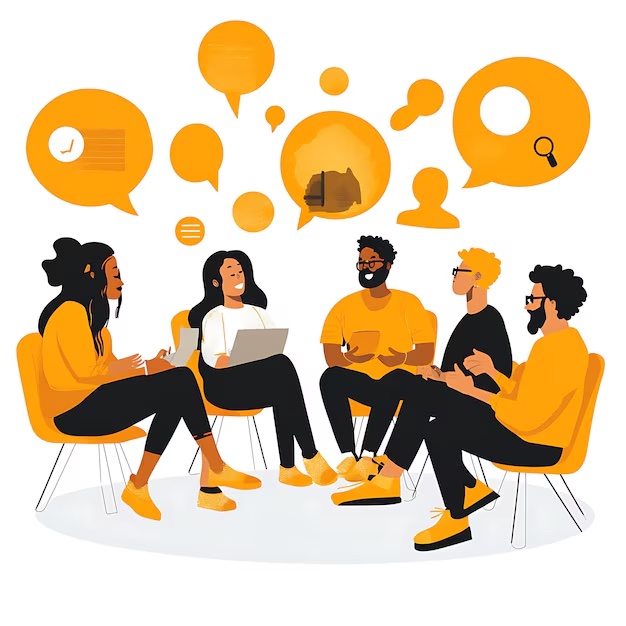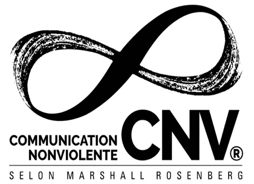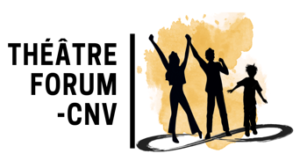Training
Durée : 3×2 days
Max. 15 people, in person only
Workshop from 9 AM to 5 PM each day
Why follow this workshop?
To develop a posture of non-violent cooperation in your daily life, in your civic commitments and in your professional life. These courses provide an opportunity to (re)discover the foundations and intentions of the Non-Violent Communication process with people from a variety of backgrounds. By taking into account diversity and equity, as well as individual and collective traumas, these courses encourage people to find new ways of living together.
Who is it for?
For everyone. Diversity should not be an obstacle but, on the contrary, an asset: whatever your history, your economic resources, your gender, your education, your ethnic and/or religious background, your culture, your visible or invisible disability, your relationship with nature, your age, etc., you are welcome, and you can contact us to discuss the conditions that would support your participation. The workshop relies on a conscious financial contribution (CFC). To find out more: click here.
The trainers
Sophie Lewandowski: CNVC-certified trainer, CNV Forum Theatre facilitator, Dr and researcher in socio-anthropology at the IRD, specialised in systemic violence and the challenges of social and ecological transitions.
Caroline Deliry: CNVC-certified trainer, educational coordinator for the Déclic CNV & Education association, NVC individual coaching practitioner (AI-CNV). Formerly involved in international solidarity and child protection. Cross-disciplinary approach based on a background in human rights, education sciences and anthropology, and trauma issues.
Teaching approach
It’s a teaching method based on experience: experimentation, individual and group debriefing (awareness, learning), additional input and memos. Experimentation is based on examples provided by the participants, with individual, pair and group exercises: practical exercises (physical and/or verbal), role-playing, image theatre, etc. Before the course, participants are invited – if they wish – to tell the trainers about the main subjects that interest them. After the course, a booklet is given to the participants containing memos and practical and follow-up details.
What will I learn?
These are the basic NVC modules, with a particular focus on living together.
Module 1
Working at your own pace and according to your own experiences, we will move towards :
- Establishing a framework of trust and making group agreements, taking into account the diversity of equity and sensitivities.
- Being aware of the fundamental needs of humans and other living beings, the link between emotions, sensations and needs, and the link between behaviour and needs.
- Being able to detect differences (in culture, in resources) in the way needs are met and the possibility of satisfying them, and begin to take them into account.
- Beginning to recognize when individual or collective traumas are activated in a situation and regain inner balance.
- Seeing the value of listening to emotions and sensations (your own and those of others) as indicators of the needs at play (in yourself and in others).
- Being aware of communication habits, in terms of expression and listening, that lead to reaction and demotivation (for an individual, for a social group, etc.).
- Identifying when your intentions are cooperative and when your words and actions are in line with your intentions.
- Developing empathic listening skills to better understand and respect yourself and others.
- Taking care of our inner balance: a vessel for tension and a reservoir of energy, so that we have the means to be consistent with our intentions in relationships.
- Seeing and expressing gratitude.
Module 2
- Update the trust framework for group agreements, taking into account diversity, equity and sensitivities.
- Take account of differences (in culture, resources) in the way and the possibility of satisfying needs.
- Continue to recognise when individual or collective traumas are activated in a situation and regain inner balance.
- Identify when your intentions are cooperative and when your words and actions are aligned with your intentions. Distinguish between intention and objective.
- Practise and embed empathic listening to yourself and others to better understand and respect yourself.
- Develop the habit of seeing and expressing thanks to support living together, differentiating between compliments and appreciations. Becoming aware of the impact of compliments on our self-esteem.
- Learning to make clear requests to support cooperation.
- Distinguishing between requests and demands. Begin to be aware of the differences in power when making or receiving a request.
- Distinguish between our feelings and hidden judgements, and begin to see the influence of our culture and traumas in this area.
- Reclaiming our responsibility together by experimenting with authentic dialogue.
Module 3
- Keep the trust framework of group agreements alive, taking into account diversity, equity and sensitivities.
- Continue to take account of differences (in culture, resources) in the way and the possibility of satisfying needs.
- Continuing to recognise when individual or collective traumas are activated in a situation and regaining inner balance.
- Experiment with mediation of internal parts.
- Develop the ability to make requests that are connected to needs and open to co-creation.
- Saying and hearing no, taking into account differences in power.
- Experimenting with authentic dialogue, in groups or when the going gets tough.
- Become aware of the key difference between dependence/independence and autonomy/interdependence.

Duration: 3 x 2 days
Rates:
- You fund your own participation:
The workshop relies on a conscious financial contribution (CFC)
What is CFC? - Your employer funds your participation:
– 750€ (small institutions)
– 1 500€ (large institutions)
How can I get funding?
Accommodation and meals not included.
Diversity and equity:
Economic resources, level of education, gender, ethnicity, disability or illness, religion, age… if you are personally concerned by any of these or other topics, you can share with me what would be helpful for you to attend, either in the registration form or by sending me a text message specifying the topic at (+33) 7 77 93 82 98: I will call you back.
Location:
Centre social Bernard Dubois, 13001 Marseille
Upcoming dates
Testimonials


Bring one of the courses or the entire programme to your region, country or institution
Contact me